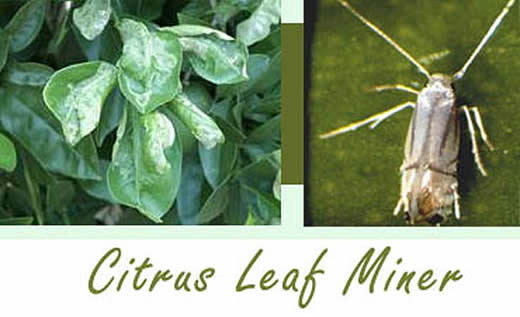
|
Citrus leafminers have become a common pest in citrus trees across the country in recent decades. Diagnosis of an infestation is as simple as looking at the bottoms of the leaves on your tree. They leave a little squiggly trail through the underside of the leaf as they eat, and poop, their way through it. Trees affected include all citrus trees, such as oranges, lemons, limes, and grapefruit, but also related species like kumquat and calamondin. Citrus leafminers are the larval phase of the Phyllocnistis citrella moth. The female leafminer moth lays its eggs on the bottom of a leaf, and when they hatch, the larvae will burrow under the outermost layer of the leaf. At first, the mine will be barely visible, but over the course of a few weeks the larvae will grow and molt four times, growing larger and making the mine larger and more visible. Eventually, the larvae will emerge as a pre-pupae and roll itself into the edge of the leaf while it transitions into its final phase of life, a little moth. Citrus lLeafminer moths are small, silvery or white with brown and white markings and distinctive spots at the ends of their wings. Citrus leafminer larvae prefer new, tender growth to eat. Old, hardened leaves are not on the menu. This makes older established trees much less appealing and keeps the damage that leafminers cause them to a minimum. Younger trees may have a harder time with them, but generally will recover just fine as they grow larger. Even significant infestations will rarely kill trees, but may inhibit growth. The suggested treatment for citrus leafminers is Spinosad, a pesticide that is derived by fermentation by several species of bacteria. Since leafminers are eating the insides of the leaves, Spinosad won't do much for miners that are currently in the leaves. It will, however, interrupt the life cycle when young larvae first eat into the leaves, or burrow their way out at the end of their larval stage. Spinosad is considered safe for pets, and approved for organic agriculture, but exposure can cause skin and eye irritation, so it's best to avoid applying it on a windy day - and wash your hands after its application. Defending your young trees from further generations of citrus leafminers will help them thrive to become large, productive trees. Preventing this generation from birthing the next will go a long way towards that goal. |